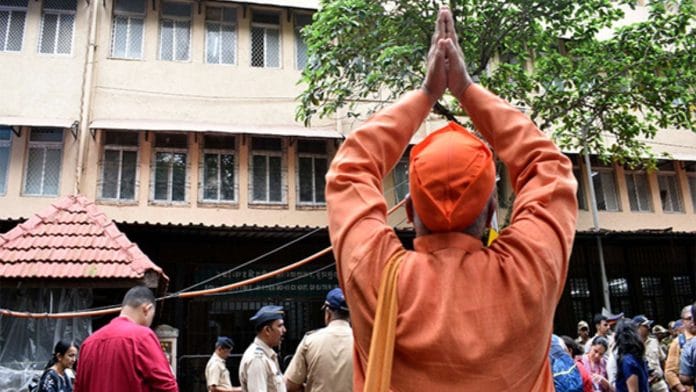An explosive went off during the holy month of Ramadan in Maharashtra’s Malegaon in 2008. Six people died. Almost a hundred others were injured. It’s been 17 years, but in the eyes of the judiciary, there are still no answers as to who was responsible for the attack.
And, the most unfortunate part is that nobody seems to be interested in finding out, least of all the government.
A trial court in Mumbai gave its judgment on the case Thursday, acquitting all seven accused, including former Bharatiya Janata Party (BJP) MP Pragya Singh Thakur, saying there was strong suspicion, but not enough evidence to convict them.
The court ordered compensation of Rs 2 lakh to the families of those who died in the attack, and Rs 50,000 for the families of those injured. But it is too little, too late.
The Malegaon blast case has, after all, been a victim of politics, and justice or closure has been the biggest casualty. For this reason, the Malegaon blast verdict is ThePrint’s ‘Newsmaker of the Week.’
“Saffron terror” politics
The Malegaon case has been in the public discourse for 17 years, more for the politics surrounding it than for any significant details regarding the investigation process.
The probe in the immediate aftermath of the blasts, under the Maharashtra Anti Terrorism Squad (ATS) and its former chief Hemant Karkare, had led to the arrests of a bunch of Hindutva activists, including Pragya Singh Thakur, as well as Lt Colonel Prasad Purohit, an Army officer. The accused were said to be linked to a Hindu fundamentalist group, Abhinav Bharat.
India had seen a fair number of terror attacks across the country in 2008, raising questions on the efficiency of the home ministry under the United Progressive Alliance (UPA) government. The initial revelations in the Malegaon probe gave a political opportunity to the Congress to turn the narrative.
The party raised red flags on terrorism allegedly sponsored by Hindutva organisations, with some senior leaders such as P Chidambaram, Digvijaya Singh, and Sushilkumar Shinde using the word “saffron terror”. They blamed the Bharatiya Janata Party (BJP) and the Rashtriya Swayamsevak Sangh (RSS) for allegedly encouraging such fringe Hindutva groups.
These strong statements had at the time sparked a debate on how the term “saffron terror” defames the entire Hindu religion and how terror should not be seen through the lens of any religious colour. The BJP and RSS, meanwhile, slammed the Congress for allegedly trying to appease the minorities.
Karkare was killed in the 2008 Mumbai attacks. His death too became politically controversial as the Union Minority Affairs Minister AR Antulay, a Congressman from Maharashtra, suggested that there could be a larger controversy behind the IPS officer’s death.
Thursday’s verdict came as vindication for the BJP’s political narrative, with party leaders blaming the Congress for allegedly casting Hindus in a bad light, asking for an apology.
It was ironic. The government’s law enforcement agency had lost a case. It had failed to show sufficient evidence to get a conviction, despite having 17 years, over ten of which were under a BJP-led government at the Centre. And yet, those in power were celebrating.
Also read: Fauja Singh’s death shows Indian roads remain a national emergency—474 lives lost every day
Opposition busy trying to get script right
After the verdict, several Congress leaders asked if Pragya Singh Thakur and others are now acquitted, then who was behind the blast? However, the question was blunted by their more emphatic attempts at distancing the Congress from the term “saffron terror”.
Talking about “saffron terror” in a Hindu-majority democracy had hurt the Congress even back then. In today’s scenario, where the BJP has been working with every small spiritual and religious outfit on the ground to consolidate the Hindutva voter base, the consequences could be even worse.
So, one after the other, leaders of the Congress tried to make all the right noises, loudly speaking about how they had never coined the term “saffron terror,” how terror has no religion, and how Congress condemns all acts of terror.
The question that should have been the loudest of all—who committed the crime—came out barely as a whimper.
The Shiv Sena (Uddhav Balasaheb Thackeray) questioned the failure of the government’s law enforcement agencies with two back-to-back acquittals in terror cases—first the 2006 Mumbai train blasts and now the 2008 Malegaon blast.
However, it stopped short of asking or even suggesting that the National Investigation Agency (NIA) should appeal against the trial court’s decision in a higher court. After all, back in 2008, when the Shiv Sena was still undivided under Bal Thackeray’s leadership and was a BJP ally, it had openly supported the Malegaon blast accused. On one occasion, party workers had even showered flower petals over the accused outside a Nashik courtroom.
Last month, after the Bombay High Court tore into the Maharashtra ATS over the 2006 Mumbai train blasts probe and acquitted all 12 accused, all of whom were Muslims, the Maharashtra government promptly appealed in the Supreme Court.
Now that an NIA trial court has done the same in the Malegaon blast case, neither the government nor the agency has shown any urgency in appealing to a higher court. The NIA has said it will decide whether to appeal after studying the order.
The political pandemonium will continue as Maharashtra gears up for urban and rural local body polls sometime next year. For the victims and their families, any closure still seems to be a long way off.
(Edited by Ratan Priya)






